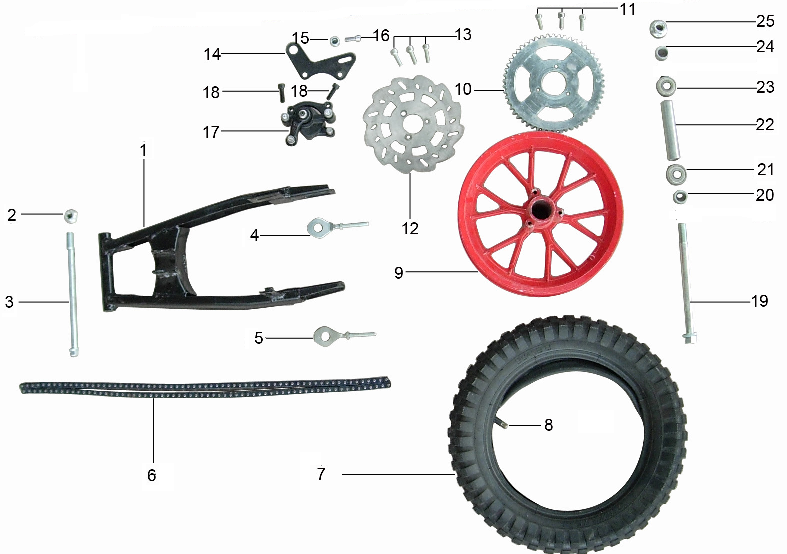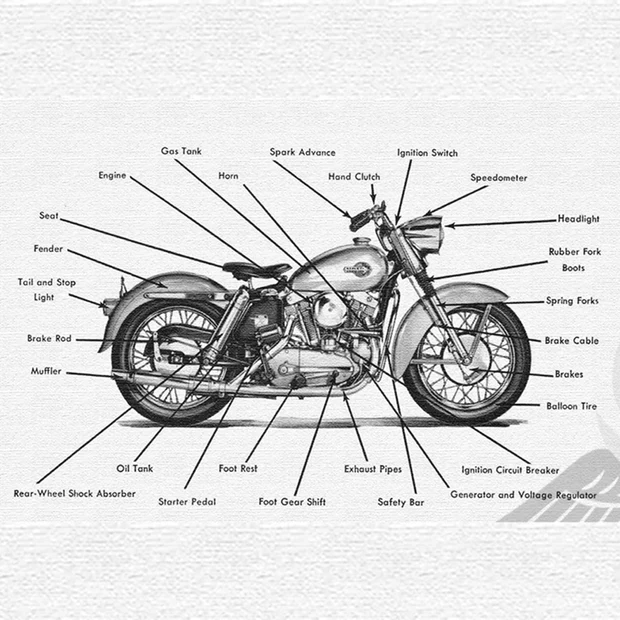Top 5 Motorcycle Parts Auckland for Riders in NZ
Top 5 Motorcycle Parts Auckland for Riders in NZ
Blog Article
Discover the Crucial Motorcycle Parts You Required for Optimal Efficiency
Recognizing the crucial parts of a bike is fundamental for achieving peak efficiency. Each part, from the engine to the braking system, plays a vital role in total capability and safety and security. Normal upkeep can stop unforeseen failings and enhance the riding experience. Numerous riders ignore the ins and outs of these systems. Discovering how they collaborate can bring about an extra effective ride. What critical components should every biker prioritize?
The Engine: The Heart of Your Motorbike
The engine works as the core element of a motorcycle, driving its efficiency and specifying its abilities. It is in charge of converting fuel into mechanical energy, which powers the bike forward. Various types of engines are utilized, consisting of single-cylinder, V-twin, and inline arrangements, each offering unique features fit for various riding styles and objectives. The engine size, normally gauged in cubic centimeters (cc), significantly influences performance, with larger engines generally offering more power and torque.Furthermore, the engine's style and innovation, such as gas shot systems or air-cooling versus liquid-cooling, affect effectiveness and dependability. Maintenance is essential for peak operation; aspects like routine oil modifications and checking trigger plugs assurance durability. Motorcyclists often think about an engine's responsiveness and level of smoothness, as these characteristics improve the overall riding experience. Ultimately, the engine stays a crucial aspect that specifies not just the bike's performance yet also the rider's link to the device.
The Transmission: Changing Gears Smoothly
The transmission plays a vital duty in a motorcycle's performance, specifically in the technicians of equipment changing. Understanding just how to shift equipments smoothly can boost the overall riding experience, while normal upkeep warranties peak capability. Appropriate attention to these elements can significantly affect the durability and efficiency of the motorcycle.

Equipment Shifting Mechanics
Smooth gear moving is essential for ideal motorcycle efficiency, significantly impacting both velocity and control. The auto mechanics of gear shifting include the communication in between the clutch, gear lever, and transmission system. When a rider involves the clutch, it disengages the engine from the transmission, enabling an equipment modification without harming the components. A well-timed launch of the clutch, combined with exact movement of the equipment bar, facilitates a smooth modification between equipments. This process assures that the engine operates within its ideal power band, boosting efficiency. Motorcycle Spares Christchurch. Furthermore, recognizing the equipment ratios and their impact on speed and torque can help motorcyclists make notified choices during shifts, inevitably contributing to a much more receptive and satisfying riding experience
Maintenance Tips Importance
Routine maintenance plays a vital function in assuring that the transmission system runs efficiently, enabling smooth equipment changes. Frequently checking and transforming the transmission fluid is vital, as old fluid can lead to enhanced friction and wear. Additionally, checking the clutch for wear warranties peak involvement and disengagement, preventing slippage throughout gear changes. Lubrication of moving components is similarly essential to reduce friction and improve performance. Motorcycle proprietors should likewise check for leaks and unusual sounds, as these can indicate underlying concerns. By sticking to these upkeep tips, motorcyclists can extend the life expectancy of their transmission system, assuring that gear shifts stay smooth and contributing to the total efficiency of their motorbike.
The Braking System: Ensuring Security on Every Adventure
Braking systems are basic parts that straight affect a motorbike's safety and security and efficiency. They include various components, including brake pads, blades, calipers, and hydraulic lines, all functioning together to ensure reliable deceleration. The kind of braking system-- usually either disc or drum-- affects responsiveness and stopping power.Regular maintenance is important to support peak performance; worn brake pads can bring about lowered efficiency and enhanced stopping distances. In addition, the high quality of brake fluid need to be kept track of, as it can absorb dampness over time, endangering stopping efficiency.Riders must also take into consideration the value of anti-lock stopping systems (ABDOMINAL), which stop wheel lockup during abrupt stops, improving overall safety and security. Properly operating brakes are not simply concerning quiting; they impart confidence in the cyclist, permitting safer navigating via various surfaces. Inevitably, a trustworthy braking system is essential for appreciating every adventure with peace of mind.
The Suspension: Enhancing Convenience and Control
A well-functioning suspension system considerably contributes to a motorbike's total performance, matching the efficiency of the stopping system. The suspension plays a considerable duty in taking in shocks from irregular surfaces, ensuring a smoother experience while keeping tire contact with the road. This call is vital for both security and control, enabling riders to browse corners with confidence and precision.Different sorts of shock absorber, such as telescopic forks or mono-shocks, offer varying levels of comfort and handling. Appropriately tuned suspension enhances responsiveness, supplying the biker with a more connected feel to the motorcycle. Regular maintenance checks are necessary to determine the suspension elements, consisting of dampers and springs, are operating at their ideal. A reliable suspension system not just elevates the riding experience however additionally contributes to the durability of other motorcycle components by decreasing damage. Therefore, purchasing quality suspension is essential for any kind of major motorbike fanatic.
The Tires: Linking You to the Roadway
Tires play a vital function in a motorcycle's efficiency, serving as the primary link between the cyclist and the roadway. Understanding the different kinds of tires available can significantly affect handling and safety and security. Additionally, routine upkeep is vital to ensure peak tire performance and longevity.
Tire Types Explained
How do various tire kinds affect a motorcycle's performance? Tire kinds play a crucial function in identifying a motorbike's handling, stability, and grip. Sport tires, designed for high performance, offer boosted grip and responsiveness on paved roads, making them ideal for competing and hostile riding. On the other hand, touring tires focus on longevity and convenience, supplying a smoother ride for long-distance travel. Off-road tires, identified by their tough step patterns, master grip on unpaved surface areas, suitable for experience enthusiasts. Furthermore, dual-sport tires blend characteristics from both on-road and off-road groups, satisfying versatile riding needs. Ultimately, picking the best tire type is essential for enhancing efficiency, making sure safety, and improving the total riding experience.
Maintenance Tips Offered
While riding when driving, preserving excellent tire condition is important for safety and performance. Frequently inspecting tire stress is very important, as under-inflated tires can cause here inadequate handling and raised wear. It is suggested to inspect step depth regularly; worn tires concession grip and stability. In addition, motorcyclists ought to search for indications of damages, such as cracks or bulges, which can show the requirement for replacement. Revolving tires occasionally guarantees also use, improving long life. Keeping tires tidy from debris and avoiding too much curbs can lengthen their lifespan. Preserving proper positioning and balance adds to come to a head efficiency, decreasing stress on various other bike parts. Following these upkeep pointers will significantly improve the general riding experience.
The Gas System: Fueling Performance and Performance
The gas system plays an essential role in making the most of a motorcycle's performance and effectiveness, as it assures the optimum shipment of fuel to the engine. It makes up several crucial elements, consisting of the fuel tank, fuel pump, gas filter, and fuel injectors or carburetor. Each part should operate effectively to ensure a smooth and powerful ride.The gas container stores fuel and supplies it to the engine through the fuel pump, which generates the required pressure. A gas filter avoids pollutants from going into the engine, while the injectors or carburetor mix gas with air for combustion.Proper maintenance of the fuel system is essential; a stopped up filter or malfunctioning injector can result in decreased performance and enhanced fuel consumption. By confirming that the gas system runs efficiently, motorcyclists can appreciate enhanced throttle action, better gas economic climate, and overall boosted riding experience.
The Electric System: Powering Your Ride
An efficient electrical system is crucial for the general capability and safety of a motorbike, as it powers vital elements such as the ignition, illumination, and numerous electronic systems. This system includes the battery, which shops power, and the generator, liable for producing power while the engine runs. The circuitry harness attaches these parts, making certain trusted power distribution.Additionally, merges protect the system from overloads, while relays assist manage high-current tools with low-power signals. A properly maintained electrical system enhances efficiency by ensuring smooth begins and consistent operation of signals and lights, important for motorcyclist exposure and safety.Regular checks of the battery's cost and links are necessary for avoiding electric failures. Bikers need to also examine circuitry for deterioration, making sure all components operate ideally. Inevitably, a robust electric system contributes substantially to the overall performance and reliability of the motorbike.
Frequently Asked Questions
Just how Typically Should I Change My Bike's Battery?
The frequency of motorcycle battery replacement depends upon use and upkeep (Motorcycle Spares Christchurch). Generally, batteries must be changed every three to 5 years. Regular checks can aid identify when a replacement is required for peak efficiency
What Devices Do I Need for Fundamental Bike Maintenance?
For standard motorbike maintenance, one requires necessary tools such as an outlet set, wrenches, screwdrivers, pliers, tire pressure scale, and a torque wrench. These devices help with effective maintenance and ensure the motorcycle runs successfully and securely.
How Can I Boost My Motorcycle's The rules of aerodynamics?
To boost motorcycle aerodynamics, one ought to consider changing fairings, making use of windscreen expansions, maximizing body placement, and lowering total weight. These adjustments aid minimize drag, boosting stability and gas efficiency throughout rides.
What Are the Signs of a Failing Electric System?
Indications of a stopping working electrical system consist of dimming lights, difficulty beginning, uneven tool analyses, and blown fuses. Oem Parts New Zealand. Unusual smells or corrosion around battery terminals might likewise show underlying issues needing instant focus for security and efficiency

Just how Do I Select the Right Oil for My Motorbike?
When choosing oil for a bike, one ought to think about the manufacturer's specs, thickness ratings, and the sort of riding. Additionally, artificial versus standard oil can affect performance and engine defense, affecting the choice substantially. The engine dimension, typically measured in cubic centimeters (cc), significantly influences efficiency, with bigger engines generally offering even more power and torque.Furthermore, the engine's layout and technology, such as gas shot systems or air-cooling versus liquid-cooling, influence efficiency and reliability. A well-functioning suspension system considerably contributes to a motorcycle's general performance, matching the efficiency of the stopping system. The gas system plays an essential function in maximizing a motorbike's efficiency and performance, as it assures the optimum distribution of gas to the engine. A gas filter prevents contaminants from getting in the engine, while the injectors or carburetor mix fuel with air for combustion.Proper upkeep of the gas system is important; a clogged up filter or malfunctioning injector can lead to reduced performance and raised gas consumption. A properly maintained electric system improves performance by making sure smooth starts and constant procedure of signals and lights, crucial for biker exposure and safety.Regular checks of the battery's cost and links are vital for stopping electric failings.
Report this page